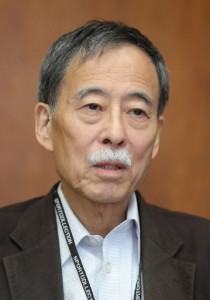RERF chairman discusses organization’s strategy to pursue further research on radiation effects
Mar. 8, 2017
by Gosuke Nagahisa, Staff Writer
On March 7, Otsura Niwa, the chairman of the Radiation Effects Research Foundation (RERF), an organization jointly managed by the governments of Japan and the United States and located in Minami Ward, stated that the new research strategy of his organization will include an effort to examine the mechanism of how radiation affects the human body. Details of the strategy are expected to be released to the public in June. Prior to marking the 70th anniversary of RERF’s establishment on March 10, Mr. Niwa sat down for an interview with the Chugoku Shimbun.
According to the epidemiological research being conducted by RERF to track the health conditions of about 120,000 A-bomb survivors, it has been found that the incidence of cancer rises in connection with exposure to the bomb’s radiation. Mr. Niwa stressed that the use of both the experimental data produced in the past and the advanced technology available today will enable the organization to analyze radiation’s impact on the body in greater detail.
RERF’s vision for the next five to ten years will reflect the equipment and facilities required to carry out this research and it will seek approval in June from the RERF council, its decision-making body. About relocating RERF from its aging facility, Mr. Niwa said, “This must be discussed after our strategy is made concrete.”
On March 10, 1947, the Atomic Bomb Casualty Commission (ABCC), the forerunner of RERF, rented part of the Hiroshima Red Cross hospital building and began its research. In 1950, the organization was relocated to the Hijiyama Hill Park where it is currently located. Looking back on the 70-year history of RERF, Mr. Niwa said, “Because ABCC was originally established for military purposes, the citizens of Hiroshima don’t believe that RERF is an organization they can be proud of, even though the quality of our research is high.” He also said that he would like to emphasize continuing dialogue with citizens and A-bomb survivors, as their consent is crucial for RERF research.
(Originally published on March 8, 2017)
On March 7, Otsura Niwa, the chairman of the Radiation Effects Research Foundation (RERF), an organization jointly managed by the governments of Japan and the United States and located in Minami Ward, stated that the new research strategy of his organization will include an effort to examine the mechanism of how radiation affects the human body. Details of the strategy are expected to be released to the public in June. Prior to marking the 70th anniversary of RERF’s establishment on March 10, Mr. Niwa sat down for an interview with the Chugoku Shimbun.
According to the epidemiological research being conducted by RERF to track the health conditions of about 120,000 A-bomb survivors, it has been found that the incidence of cancer rises in connection with exposure to the bomb’s radiation. Mr. Niwa stressed that the use of both the experimental data produced in the past and the advanced technology available today will enable the organization to analyze radiation’s impact on the body in greater detail.
RERF’s vision for the next five to ten years will reflect the equipment and facilities required to carry out this research and it will seek approval in June from the RERF council, its decision-making body. About relocating RERF from its aging facility, Mr. Niwa said, “This must be discussed after our strategy is made concrete.”
On March 10, 1947, the Atomic Bomb Casualty Commission (ABCC), the forerunner of RERF, rented part of the Hiroshima Red Cross hospital building and began its research. In 1950, the organization was relocated to the Hijiyama Hill Park where it is currently located. Looking back on the 70-year history of RERF, Mr. Niwa said, “Because ABCC was originally established for military purposes, the citizens of Hiroshima don’t believe that RERF is an organization they can be proud of, even though the quality of our research is high.” He also said that he would like to emphasize continuing dialogue with citizens and A-bomb survivors, as their consent is crucial for RERF research.
(Originally published on March 8, 2017)








